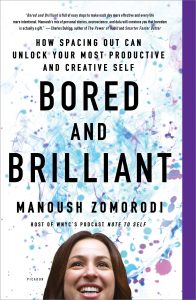Have you ever thought “I’ll just check in with >insert your favorite social media platform or online game here< and then I’ll >insert productive activity you need to undertake here<” only to find that 20, 30, or even 60 minutes have elapsed and left you feeling unfulfilled, vaguely guilty, and less motivated than you were before?
Yeah. Me, too. We’re not alone. On average, folks who participated in the WNYC Bored and Brilliant Challenge found they were on their phones 90-100 minutes a day, unlocking their phones 40-50 times a day. That's 2-3 times an hour we're awake. (If you think, "yeah, I'm not on that much" you can download the Moment app if you'd like to see just how much time you and your family are spending on your phones.)
It seems we all have less time to do the things we used to do before 2007—before the birth of the iPhone—and research shows it’s changing us. It’s changing how we communicate with other humans. It’s changing how we spend our free time and our perception of how much free time we actually have. And, importantly, it’s changing the way our brain does its work. In point of fact, with a ready distraction at our fingertips, we're not allowing ourselves to get bored anymore, denying our minds the chance to wander, take flights of fancy, solve problems and get creative. I'm going to go ahead and say it: that's not good.
I’ve been thinking about how to unplug myself (and my family) for a long time, as I’ve noticed changes in attention and communication that I didn’t feel were for the better. LPL’s summer reading theme, Unplugged, got me more motivated to find help to follow through. And good gravy, it’s hard to follow through! We need our technology for a lot of things. The way schools and organizations have jumped on the tech bandwagon have made not using technology and certain social media platforms unthinkable and untenable. It’s how schools communicate grades and where kids find their books and assignments. It’s how organizations advertise and communicate goods and services with their consumers and with each other. It’s how the majority of us find out what is going on in our community and world anymore.
Enter Bored and Brilliant: How Spacing Out Can Unlock Your Most Productive and Creative Self by Manoush Zomorodi, host of WNYC’s podcast Note to Self. In 2015, Zomorodi encouraged tens of thousands of listeners to participate in a challenge to help them unplug, get bored, and reclaim their creativity. Her listeners undertook The Bored and Brilliant Seven-Step Program, and the book grew out of the results of the challenge.
In it, Zomorodi looks at research emerging from neuroscience and cognitive psychology and makes the case for boredom as she shares the results from listeners from around the world. The challenges range from things like keeping your phone out of reach when you're in motion and not taking any pictures to deleting that app that you just can't live without. It's an insightful, quick read that I'd recommend for everyone. Bonus: the audiobook is wonderfully narrated by the author if you'd rather listen.
Frankly, there are a lot of great things about technology. Being able to put my library books on hold from my phone whenever I think of it. Listening to library audiobooks using the Libby and Hoopla apps. Looking up the location of the most beautiful libraries when I’m in a strange city. (Okay, fine, cruising for book tattoo ideas on Instagram when I’m waiting for appointments is maybe less important.) But for every plus, we’re also losing things. Our ability to recall things and our ability to read long-form material, for example, seem to be getting worse, as does our ability to communicate and our capacity for creative thinking, for our glimmers of brilliance. (I love that Zadie Smith wrote acknowledgments to two internet-blocking programs, Freedom and Self Control, in her novel NW!)
If you’re tired of being told to put down your phone and made to feel bad about it, this isn’t that kind of book. Mobile devices, wifi, and constant access have been responsible for breaking down economic, societal, and information barriers, which is a Very Good Thing. We can’t put that genie back in the bottle, and why would we, even if we could? But like all things, moderation is key, and technology companies excel knowing how to keep your eyeballs pasted to screens.
It’s hard to self-modulate for many of us, and we’re never sure how much is enough, especially when it comes to kids. (Zomorodi points out that tech creators and engineers all seem to send their own kids to a Waldorf school in Palo Alto and have very strict limits on screen time. Let that sink in a little bit…) This book gives me hope that I'll talk to my family again while everyone is looking up, and that there's a not-totally-painful way to modulate and control something that has gotten the better of me for a while.
This bit from the project website captures the idea perfectly: “This is not a digital detox. This is not an edict to lock your phone away in a drawer. This is not an ode to mindfulness. It is a way to apply what we know about constant notifications, neuroscience, and productivity to our lives. Right now.” Let's get bored and brilliant, folks, and maybe leave our hands free for something other than our phone sometimes.
Here are a few of the books Zomorodi mentions in case you wanted to do a deep dive on the subject:
READER, COME HOME: THE READING BRAIN IN A DIGITAL WORLD
-Polli Kenn is the Readers' Services Coordinator at Lawrence Public Library.






Add a comment to: The Upside of Unplugging